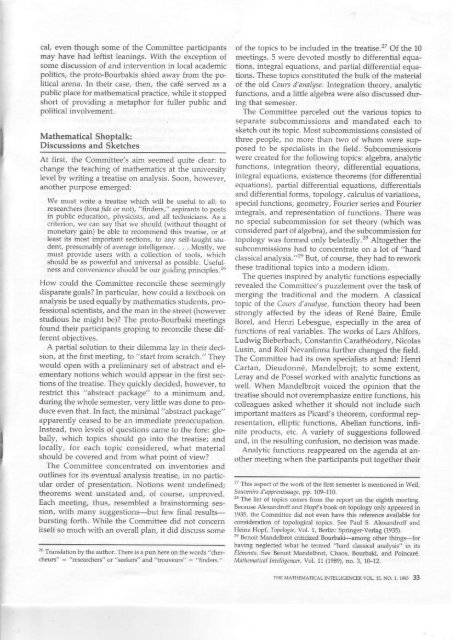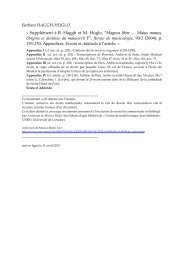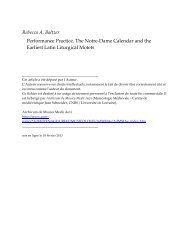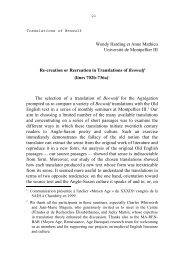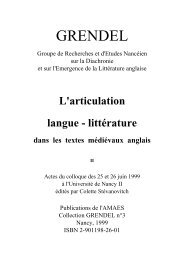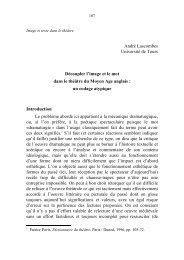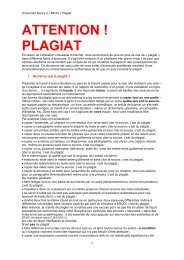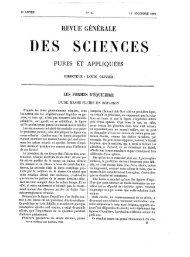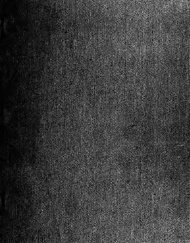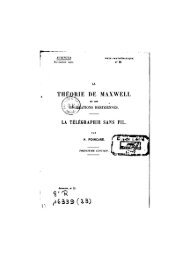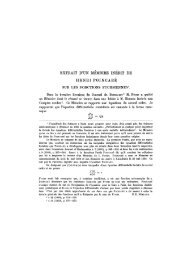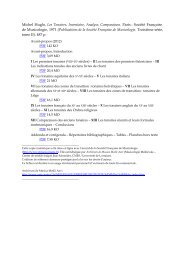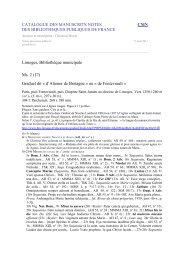Karen V. H. Parshall" A Parisian Café and Ten Proto-Bourbaki ...
Karen V. H. Parshall" A Parisian Café and Ten Proto-Bourbaki ...
Karen V. H. Parshall" A Parisian Café and Ten Proto-Bourbaki ...
Create successful ePaper yourself
Turn your PDF publications into a flip-book with our unique Google optimized e-Paper software.
cal, even though some of the Committee participants<br />
may have had leftist leanings. With ihe exception of<br />
some discussion of <strong>and</strong> intervention in local academic<br />
politics, the proto-<strong>Bourbaki</strong>s shied away from the political<br />
arena. In their case, then, the café served as a<br />
public place for mathematical practice, while it stopped<br />
short of providing a metaphor for fuller public <strong>and</strong><br />
political involvement.<br />
How could the Committee reconcile these seemingly<br />
disparate goals? In particular, how could a textbook on<br />
analysis be used equally by mathematics students, professional<br />
scientsts, <strong>and</strong> the man in the street (however<br />
studious he might be)? The proto-<strong>Bourbaki</strong> meetings<br />
found their participants groping to reconcile these different<br />
objectives.<br />
A partial solution to their dilemma lay in their decision,<br />
at the first meeting, to "start from scratch." They<br />
would open with a preliminary set of abstract <strong>and</strong> elementary<br />
notions which would appear in the first sections<br />
of the treatise. They quickly decided, however, to<br />
restrict this "abstract package" to a minimum <strong>and</strong>,<br />
during the whole semester, very little was done to produce<br />
even that. In fact, the minimal "abstract package"<br />
apparently ceased to be an immediate preoccupation.<br />
Instead, two levels of questions came to the fore: globally,<br />
which topics should go into the heatise; <strong>and</strong><br />
locally, for each topic considered, what material<br />
should be covered <strong>and</strong> from what point of view?<br />
The Committee concentrated on inventories <strong>and</strong><br />
outlines for its eventual analysis treatise, in no particular<br />
order of presentation. Notions went undefined;<br />
theorems went unstated <strong>and</strong>, of course, unproved.<br />
Each meeting, thus, resembled a brainstorming session,<br />
with many suggestione-but few final resultsbursting<br />
forth. While the Committee did not concern<br />
itself so much with an overall plan, it did discuss some<br />
26 Translation by the author. There is a pun here on the words "chercheurc"<br />
: "researchers" or "seekers" <strong>and</strong> "houveuts" : "finders."<br />
of the topics to be included in the treatise.zT Of the 10<br />
meetings, 5 were devoted mostly to differential equations,<br />
integral equations, <strong>and</strong> partial differential equations.<br />
These topics constituted the bulk of the material<br />
of the old Cours d'analyse. Integration theory, analytic<br />
functions, <strong>and</strong> a little algebra were also discussed during<br />
that semester.<br />
The Committee parceled out the various topics to<br />
separate subcommissions ând m<strong>and</strong>ated each to<br />
skeich out its topic. Most subcommissions consisted of<br />
Mathematical Shoptalk:<br />
three people, no more than two of whom were sup-<br />
Discussions <strong>and</strong> Sketches<br />
posed to be specialists in the field. Subcommissions<br />
At first, the Committee's aim seemed quite clear: to were created for the following topics: algebra, analytic<br />
change the teaching of mathematics at the university functions, integration theory, differential equations,<br />
level by writing a treatise on analysis. Soon, however, integral equations, etstence theorems (for differential<br />
another purpose emerged:<br />
equations), partial differential equations, differentials<br />
<strong>and</strong> differential forms, topology, calculus of variations,<br />
We must wr:ite a treatise which will be useful to all: to special functions, geometry, Fourier series <strong>and</strong> Fourier<br />
rcsearcherc (bona fide or not), "finders," aspirants to posts<br />
integrals,<br />
in public<br />
<strong>and</strong> representation<br />
education, physicists,<br />
of<br />
<strong>and</strong> all technicians.<br />
functions. There was<br />
As a<br />
criterion, we can say that we should (without thought of no special subcommission for set theory (which was<br />
monetary gain) be able to recommend this treatise, or at considered part of algebra), <strong>and</strong> the subcommission for<br />
least its most important sections, to any self-taught stu- topology was formed only belatedly.2E Altogether the<br />
dent, presumably of average intelligence. . . . Mostly, we subcommissions had to concentrate on a lot of "hard<br />
must provide users with a collection of tools, which<br />
classical<br />
should<br />
analysis."2e But,<br />
be as powerful <strong>and</strong> universal as possible.<br />
of course, they had to rework<br />
Usefulness<br />
<strong>and</strong> convenience should be our guiciing principles." these traditional topics into a modern idiom.<br />
The queries inspired by analytic functions especially<br />
revealed the Committee's puzzlement over the task of<br />
merging the tradltional <strong>and</strong> the modern. A classical<br />
topic of ihe Cours d'analyse, function theory had been<br />
sirongly affected by the ideas of René Baire, Émile<br />
Borel, <strong>and</strong> Henri Lebesgue, especially in the area of<br />
functions of real variables. The works of Lars Ahlfors,<br />
Ludwig Bieberbach, Constantin Carathéodory, Nicolas<br />
Lusin, <strong>and</strong> Rolf Nevanlinna further changed the field.<br />
The Committee had its own specialists at h<strong>and</strong>: Henri<br />
Cartan, Dieudonné, M<strong>and</strong>eibrojt; to some extent,<br />
Leray <strong>and</strong> de Possel worked with analytic functions as<br />
well. When M<strong>and</strong>elbrojt voiced the opinion that the<br />
treatise should not overemphasize entire functions, his<br />
colleagues asked whether it should not include such<br />
important matters âs Picard's theorem, conformal representation,<br />
elliptic functions, Abelian functions, infinite<br />
products, etc. A variety of suggestions followed<br />
<strong>and</strong>, in the resulting confusion, no decision was made.<br />
Analytic functions reappeared on the agenda at another<br />
meeting when the participants put together their<br />
27<br />
this aspect of the work of the fust semester is mentioned in Weil,<br />
Souoefiirs d' apprentissage, pp. 109:110.<br />
'?3<br />
The list of topics comes from the report on the eighth meeting.<br />
Because Alex<strong>and</strong>roff <strong>and</strong> Hopfs book on topology only appeared in<br />
1935, the Committee did not even hav€ this reference available for<br />
consideration of topological topics. See Paul S. Alex<strong>and</strong>roff <strong>and</strong><br />
Heinz Hopf, Topologie, Vol. l, Berlin: Springer-Verlag (1935).<br />
'-<br />
Benoit M<strong>and</strong>elbrot criricized Bourbali---among other thing+for<br />
hâving neglected what he termed "hard dassical analysis" in its<br />
Ê.\émmX. See Benoit M<strong>and</strong>elbrot, Chaos, <strong>Bourbaki</strong>, <strong>and</strong> Poincaré,<br />
Mathematical lntelligencer, Vol. 11(1989), no. 3, 10-12.<br />
THE MÀTHEMATcAL INTELUcENcER vol-. It No. 1,1993 33


